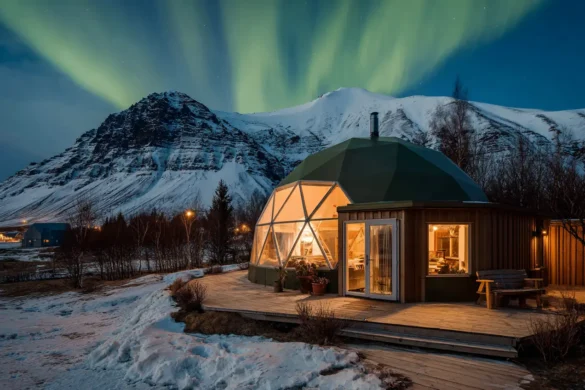Navarre completely caught me off guard. The moment I stood on the ancient walls of Olite Castle, watching storms roll in across vineyards and red tile roofs, I knew this wasn’t the Spain I thought I knew. When I hiked through Irati Forest, with beech trees towering overhead in Europe’s second-largest forest, the silence was so deep I could hear my own heartbeat.
From the otherworldly desert landscape of Bardenas Reales (where I swear I felt like I was on Mars) to the green valleys of the Pyrenees, these are the most beautiful places in Navarre that will make you rethink everything about northern Spain. Let me show you my favorite spots in this incredible region where Game of Thrones-worthy castles meet wild mountain landscapes!
Unmissable Places to Visit in Navarre in 2025
Visiting Navarre in 2025? Spend the day exploring the otherworldly landscapes of Bardenas Reales Natural Reserve, uncover the legends of the Cave of Zugarramurdi, or marvel at the breathtaking scenery of the Foz of Arbayun. Wander through the stunning Gorges of Lumbier and Arbaiun, enjoy local cuisine in charming villages, or embark on an outdoor adventure in the region’s natural beauty. Whether you’re into history, outdoor exploration, or dramatic landscapes, Navarre has plenty to offer!

1. Bardenas Reales Natural Reserve
Bardenas Reales honestly feels like stepping onto Mars without leaving Europe. This 42,500-hectare semi-desert landscape in southeastern Navarre showcases some of the most bizarre rock formations you’ll see anywhere – think clay castles, white cliffs, and mysterious mesas that Game of Thrones filmmakers couldn’t resist using as the Dothraki Sea.
I spent three hours driving the 34-kilometer loop road and couldn’t believe places like this exist in Spain. The famous Castildetierra formation looks like a giant sandcastle that’s about to collapse, while Bardena Blanca reveals ghostly white badlands that change color throughout the day. Spring brings wildflowers that actually bloom across the desert floor, creating this crazy contrast against the barren landscape.
The park is completely free to visit, though you can’t wander off the marked roads (military zones and fragile ecosystems). Early morning or late afternoon visits are pure magic when the lighting transforms everything. The Aire de Bardenas hotel sits right at the park’s edge if you want to wake up in a futuristic cube room overlooking this otherworldly landscape.

2. Cave of Zugarramurdi
Zugarramurdi is basically the witch capital of Spain, and the cave where it all supposedly happened is genuinely atmospheric. This 120-meter limestone tunnel earned its dark reputation during the Spanish Inquisition when 11 people were burned at the stake in 1610 for alleged witchcraft practiced here.
Walking through the cave in broad daylight is perfectly safe, but the dramatic acoustics and shadows still give you goosebumps. The stream called Infernuko Erreka (literally “Stream of Hell”) runs right through it, which honestly doesn’t help the spooky factor. I visited on a regular Tuesday and could easily imagine why people thought supernatural things happened here centuries ago.
The Witch Museum in town provides historical context about the trials, though reviews are mixed on whether it’s worth the entrance fee. The real experience is the cave itself, which you can walk through completely for free. August’s Witch Festival brings the whole village alive with costumed locals, but the cave maintains its eerie atmosphere year-round.
- Read Next: Travel Photography Tips for Beginners

3. Foz of Arbayun
Foz de Arbayun offers Europe’s best vulture-watching experience, and I’m not exaggerating. These limestone canyon walls host Spain’s largest griffon vulture colony, with birds soaring at eye level from designated viewing platforms along the Salazar River.
The 3-kilometer trail through the gorge is relatively easy but requires sturdy shoes for rocky terrain. Early morning visits reward you with peak bird activity as vultures launch from their cliff-side nests with wingspans reaching 9 feet. Besides griffon vultures, you’ll spot golden eagles, Egyptian vultures, and peregrine falcons hunting throughout the protected canyon.
What makes this place special isn’t just the birds – it’s how close you get to them. These aren’t distant specks in the sky; they’re massive raptors gliding just feet away while you stand on safe viewing platforms. The canyon’s protected status ensures year-round populations, though spring migration brings additional species to this dramatic natural amphitheater.

4. Gorges of Lumbier and Arbaiun
Two ancient rivers carved these spectacular canyons into northern Spain’s limestone bedrock, and they’re close enough to visit both in one day. Lumbier Gorge offers the easier experience with a 1.3-kilometer paved path following old railway tunnels – perfect for families wanting dramatic scenery without challenging terrain.
Arbaiun Gorge delivers the wilder adventure with more demanding trails leading to remote viewpoints and close encounters with cliff-nesting birds. The geological grandeur stays consistent between both locations, but each canyon has distinct personality and difficulty levels.
I recommend starting with Lumbier in the morning since it’s more accessible, then tackling Arbaiun in the afternoon when you’re warmed up. The Eagle’s viewpoint in Lumbier provides the best photography spots for capturing these limestone masterpieces. April through June brings migrating birds and rushing spring waters, while September and October offer comfortable hiking temperatures.
✈️ My #1 Hack for Cheap 2026 Flights:
It’s January, so flight prices are climbing fast—but you don't have to pay them. I’m currently seeing roundtrips to Europe for under $300 (deals you won’t find on Google Flights).
Step 1: Join Going.com's Free Plan here. It takes 10 seconds and requires no credit card.
Step 2: If you're doing a big trip this year, grab the 14-day free trial of Premium. You can even use my code JON25 for 25% off.
Seriously, this is the single best money-saving tool I’ve used in 8+ years.
👉 Send me cheap 2026 flights- Read next: Adventure Quotes to Inspire Your Trip

5. Irati Forest
Irati Forest spans over 17,000 hectares of ancient beech and fir trees, making it Europe’s second-largest preserved beech woodland after Germany’s Black Forest. During autumn, the canopy transforms into a golden cathedral that photographers dream about capturing along the numerous marked trails.
The forest offers everything from gentle riverside walks to challenging mountain hikes leading to panoramic viewpoints. I particularly loved the Los Paraísos-Erlan circular route that takes about 2 hours through spectacular beech groves near the Irabia Reservoir. Wildlife thrives here with deer, wild boar, and abundant birdlife creating a soundscape that changes with the seasons.
Access points exist from both Ochagavía (Salazar Valley) and Orbaitzeta (Aezkoa Valley), each with visitor centers offering maps and trail information. The Casas de Irati reception area provides the best starting point with parking, restaurant, and bike rental services. Autumn visits feel truly transformative when morning mist rises through ancient trees and you can hear the forest wake up around you.

6. Olite Castle
Olite Castle remains one of Spain’s most complete Gothic fortresses, with 15 towers punctuating the skyline above surrounding vineyards. This wasn’t just a military fortress – it housed Navarre’s royal family and still showcases ornate chambers, secret passages, and hidden courtyards throughout its remarkably intact structure.
The Atalaya Tower provides the best panoramic views stretching to distant Pyrenean peaks on clear days. I spent nearly three hours exploring recently restored royal quarters with intricate ceiling work and medieval decorative details. Underground wine cellars maintain centuries-old traditions, hosting tastings of local Navarre varieties that complement the historical experience.
Village streets around the castle reward exploration with medieval charm and excellent wine shops selling regional specialties. The Parador hotel allows guests to actually stay within the castle walls for an authentic royal experience. Plan at least half a day to properly explore this architectural masterpiece and sample local wines – the combination of history and gastronomy makes Olite unforgettable.

7. Urbasa Natural Park
High karst plateaus suddenly drop into steep gorges throughout Urbasa Natural Park, creating some of Navarre’s most dramatic landscapes. Rolling green meadows contrast sharply with deep limestone canyons carved by ancient rivers, while Stone Age dolmens scattered across the plateau add archaeological interest to nature walks.
The GR-282 trail crosses the entire park, though shorter loops like the Lizarraga Circuit suit day hikers perfectly. Griffon vultures and golden eagles patrol overhead while foxes and wild boar inhabit the forest edges. Ancient beech forests line lower elevations, creating diverse ecosystems within this compact mountain range.
Spring transforms Urbasa into wildflower meadows, while autumn brings mushroom hunting opportunities for permit holders. The nearby Nacedero del Urederra waterfall serves as the park’s crown jewel attraction. I recommend bringing layers since mountain weather changes quickly throughout the day, and waterproof shoes for the limestone terrain that can be slippery when wet.
- Read Next: Top Airlines that Fly to Spain

8. Urederra River
Turquoise waters flow impossibly clear through limestone gorges along the Urederra River, creating a tropical paradise feeling in northern Spain. Underground springs feed this magical stream, producing a series of cascading pools that photographers absolutely adore throughout the 5-kilometer trail to the source.
The river’s Basque name “Beautiful Waters” perfectly captures its ethereal blue-green color that comes from dissolved limestone and special algae. Wooden boardwalks cross the stream multiple times, offering perfect vantage points for photography while natural swimming pools invite brave visitors to dip into the chilly mountain water.
I spent an entire morning here and could’ve stayed longer – every bend reveals another stunning cascade worth photographing. Early morning visits reward you with misty atmospheric conditions and fewer crowds along the trail. The Nacedero source at the trail’s end showcases the river’s mysterious emergence from underground caves, making the entire hike feel like discovering a secret natural wonder.

9. Valley of Baztan
Traditional Basque life flourishes throughout Valley of Baztan, where fifteen villages preserve centuries-old customs and architecture. White-walled houses with distinctive red roofs line narrow streets that wind through lush green valleys, with Pyrenean peaks providing a picture-perfect mountain backdrop.

Elizondo serves as the valley’s commercial heart, featuring excellent restaurants and charming old quarters perfect for evening strolls. Arizkun showcases impressive 18th-century mansions, while Amaiur offers medieval castle ruins to explore. Each village maintains its unique character through local festivals and traditional crafts that continue today.

Mountain trails lead through oak and chestnut forests to viewpoints overlooking the entire valley system. The nearby Señorío de Bertiz Natural Park provides botanical gardens and well-maintained hiking paths for deeper exploration. Local restaurants serve exceptional traditional cuisine, making dinner reservations essential during festival periods when Basque music and dancing fill village squares late into the night.

Global Viewpoint is a personal blog. All content is for informational and entertainment purposes only and does not constitute professional financial, medical, or legal advice.





